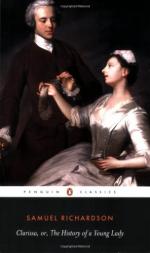I never saw the personating wretches afterwards. He persisted to the last, (dreadfully invoking Heaven as a witness to the truth of his assertion) that they were really and truly the ladies they pretended to be; declaring, that they could not take leave of me, when they left town, because of the state of senselessness and phrensy I was in. For their intoxicating, or rather stupefying, potions had almost deleterious effects upon my intellects, as I have hinted; insomuch that, for several days together, I was under a strange delirium; now moping, now dozing, now weeping, now raving, now scribbling, tearing what I scribbled as fast as I wrote it: most miserable when now-and-then a ray of reason brought confusedly to my remembrance what I had suffered.
LETTER LXX
Miss Clarissa Harlowe
[in continuation.]
[The lady next gives an account,
Of her recovery from her delirium and sleepy disorder:
Of her attempt to get away in his absence:
Of the conversations that followed, at his return, between them:
Of the guilty figure he made:
Of her resolution not to have him:
Of her several efforts to escape:
Of her treaty with Dorcas to assist her in it:
Of Dorcas’s dropping the promissory note, undoubtedly,
as she says, on
purpose to betray
her:
Of her triumph over all the creatures of the house,
assembled to terrify
her; and perhaps
to commit fresh outrages upon her:
Of his setting out for M. Hall:
Of his repeated letters to induce her to meet him
at the altar, on her
uncle’s
anniversary:
Of her determined silence to them all:
Of her second escape, effected, as she says, contrary
to her own
expectation:
the attempt being at first but the intended prelude
to
a more promising
one, which she had formed in her mind:
And of other particulars; which being to be found
in Mr. Lovelace’s
letters preceding,
and the letter of his friend Belford, are
omitted.
She then proceeds:]
The very hour that I found myself in a place of safety, I took pen to write to you. When I began, I designed only to write six or eight lines, to inquire after your health: for, having heard nothing from you, I feared indeed, that you had been, and still were, too ill to write. But no sooner did my pen begin to blot the paper, but my sad heart hurried it into length. The apprehensions I had lain under, that I should not be able to get away; the fatigue I had in effecting my escape: the difficulty of procuring a lodging for myself; having disliked the people of two houses, and those of a third disliking me; for you must think I made a frighted appearance—these, together with the recollection of what I had suffered from him, and my farther apprehensions of my insecurity, and my desolate circumstances, had so disordered me, that I remember I rambled strangely in that letter.




